Man Refuses Entry to Friend's Girlfriend's Service Dog At Party, Sparking Heated Argument
Different people adore dogs for a variety of reasons. They are intelligent, adorable, and unconditionally loving—not to mention that they are the furry best buddies you never knew you needed.
Our dogs play a vital role in our everyday existence. They cooperate with us in many ways, obey our instructions, and are loyal companions.
Research has indicated that dogs are beneficial for your health. Their skills, combined with training, enable service dogs to carry out particular duties for people with disabilities.
Currently, a wide variety of breeds of service dogs are trained to help people with disabilities by performing a range of tasks. However, did you know that some dogs can help control your diabetes and possibly save your life?
Now that is one more item to add to the list. Severe blood sugar variations in diabetics are risky and can cause significant long- and short-term health issues.
In particular, diabetic service dogs are trained to assist their owners when their blood sugar levels are abnormally high or low. The OP of today's story dislikes cats and dogs of any kind.
OP's friends know this, and primarily, he thinks they are filthy, so he wants nothing to do with them because of that. OP hosted a pumpkin carving party for his friends, only for one of them to show up with a dog.
This dog was a service dog for diabetes and belonged to the friend's girlfriend. The OP wanted the dog gone, but it came with a lot of backlash.
The OP writes

The party was indoors as it's still nearly 100 degrees during the day where he is.

OP has offered the following explanation for why they think they might be the a-hole:
AITA for not letting a service dog into my house? I might be the asshole because I was essentially keeping an important medical device away from my buddy's girlfriend.
We've gathered some of the most upvoted comments from the other Redditors for you to read through below.

Understanding Service Animal Exclusions
The refusal to allow a service dog at a social gathering raises important questions regarding the understanding and acceptance of service animals. Dr. Frank Harrison, an expert in disability rights, emphasizes that misconceptions about service animals often lead to unnecessary conflict.
Research published in the Journal of Disability Policy Studies indicates that societal attitudes towards service animals can significantly impact the experiences of individuals who rely on them for support. Such misunderstandings can create barriers to access and inclusion.
OP's buddy should have given him a heads-up beforehand.
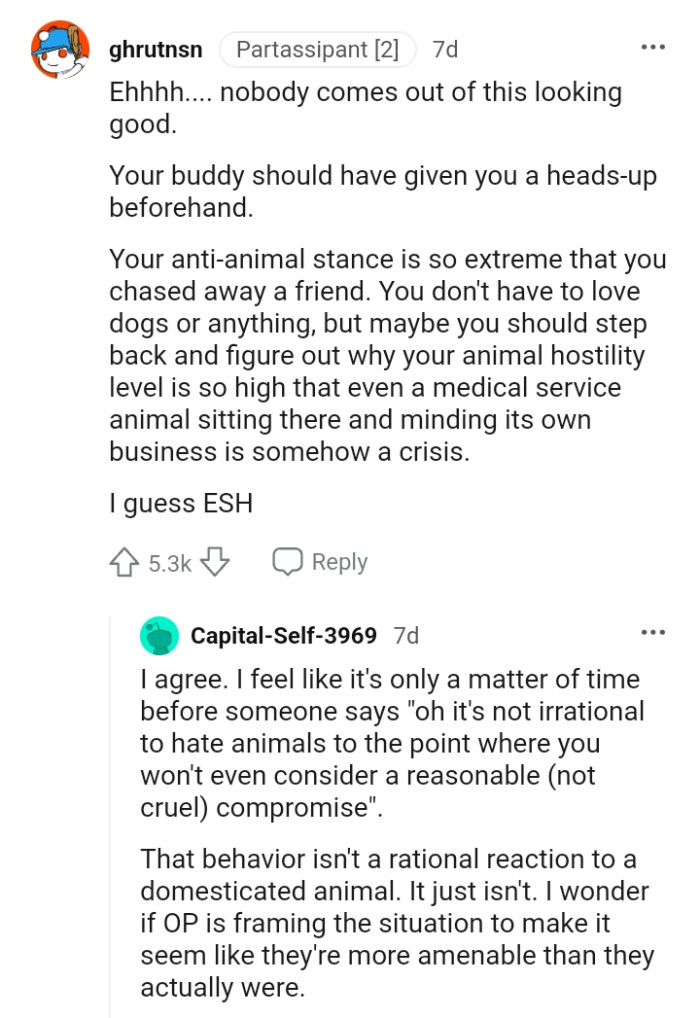
This Redditor believes that something is missing.
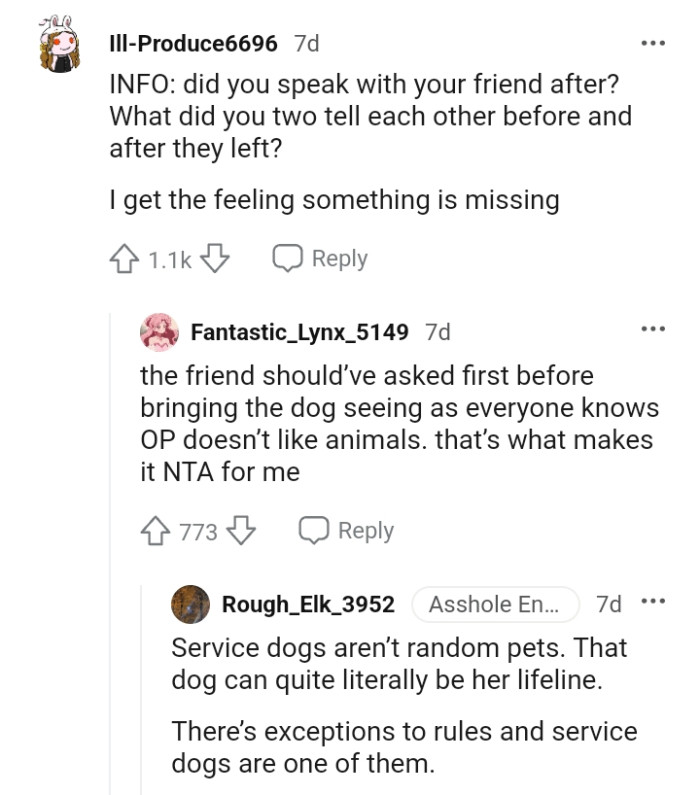
This Redditor doesn't want to get started on how the OP talks about cats and dogs.
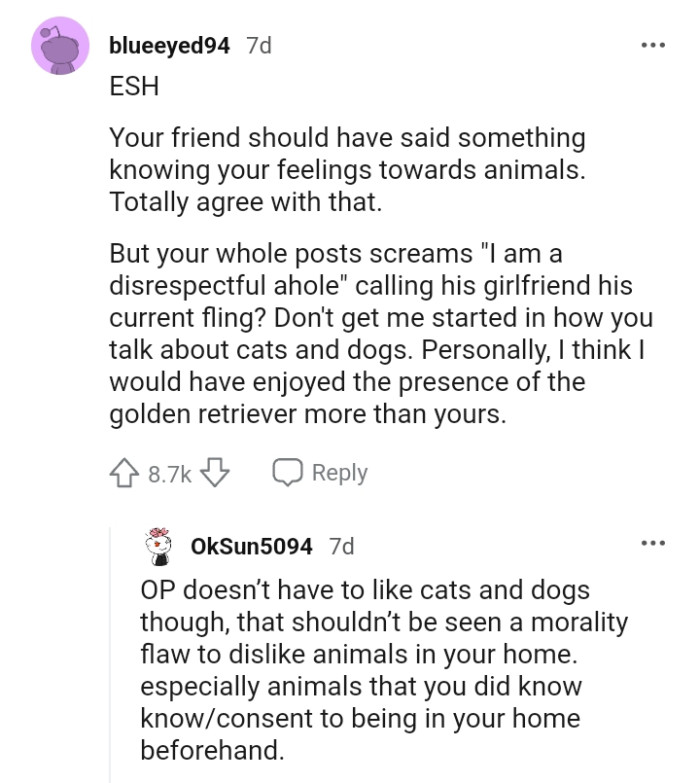
Moreover, the emotional reactions stemming from this situation can highlight deeper issues related to control and power dynamics in social settings. According to social psychology, individuals often react defensively when they feel their authority is challenged. In this case, the host's refusal may stem from a desire to maintain control over their environment.
Recognizing these dynamics is crucial for addressing the underlying tensions and fostering a more inclusive atmosphere.
It's the OP's right not to allow a service dog in his private home.
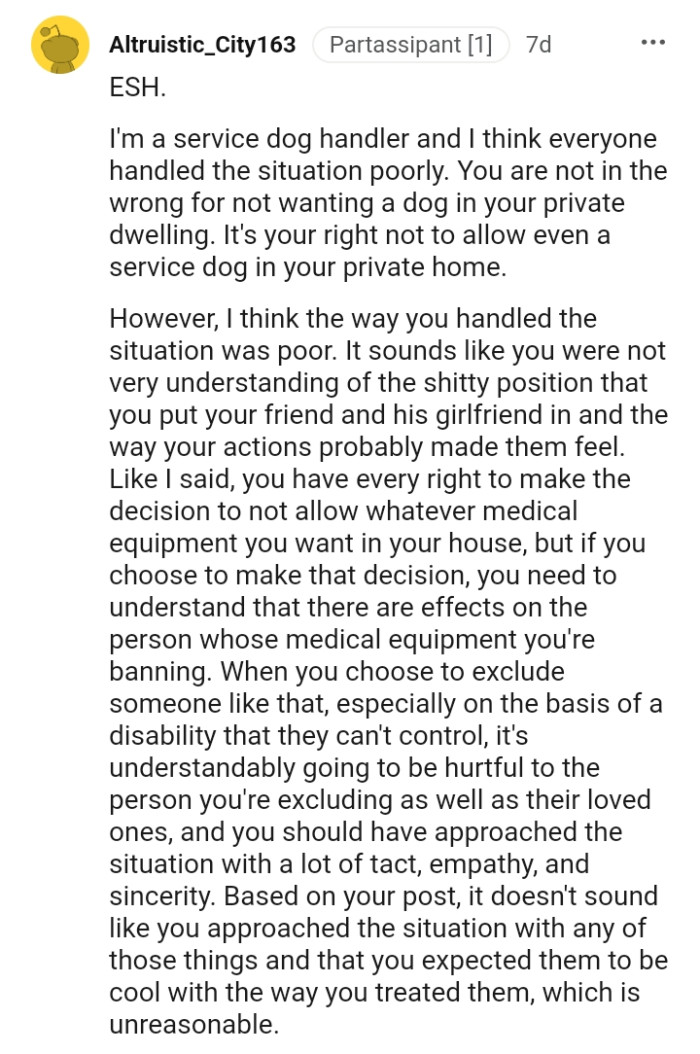
You don't just assume an animal is welcome when going to a private event.
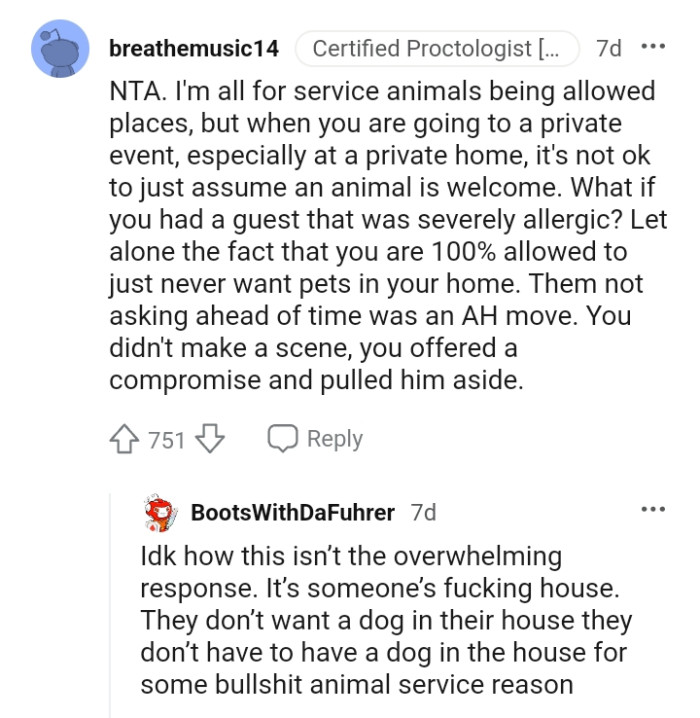
The OP doesn't have to let animals inside his home if he doesn't want to.
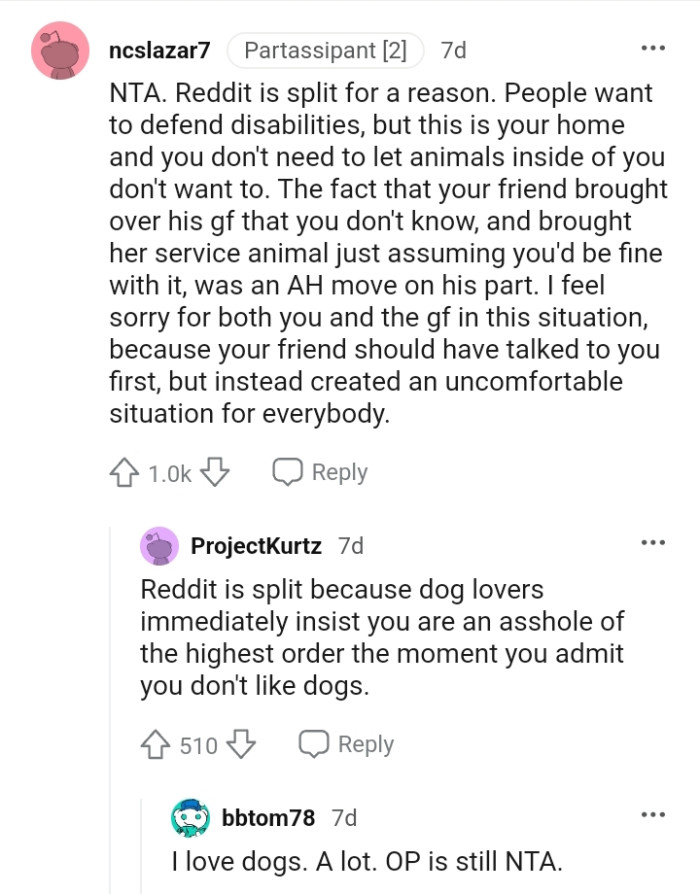
Strategies for Promoting Understanding
To promote acceptance of service animals in social settings, experts recommend educating individuals about the rights associated with service animals. Dr. Susan David, a renowned psychologist and author, emphasizes that "understanding the emotional and legal significance of service animals can foster empathy and reduce stigma." Providing resources that outline legal protections and the importance of service dogs can indeed foster empathy and understanding within communities. For more insights, visit Dr. Susan David's website.
Additionally, creating forums for open dialogue can help address misconceptions and foster a sense of community among individuals with service animals and those without.
They would not be an AH for declining the invitation.
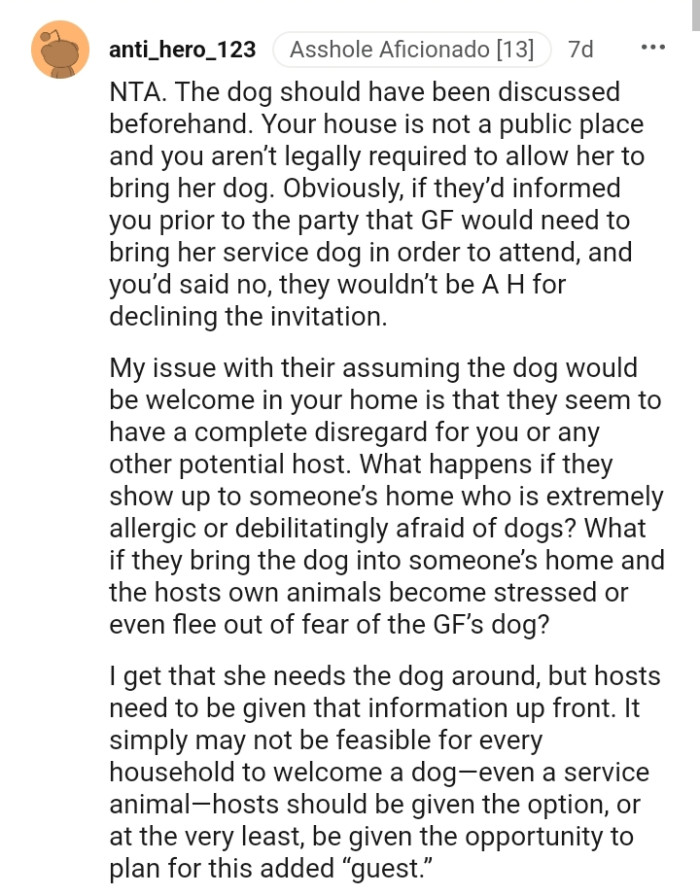
OP's tone might have been harsh.
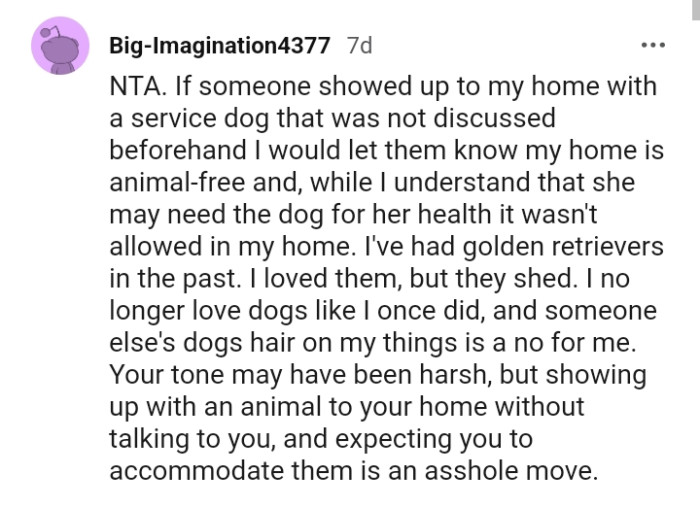
You don't just bring an animal to someone's house.
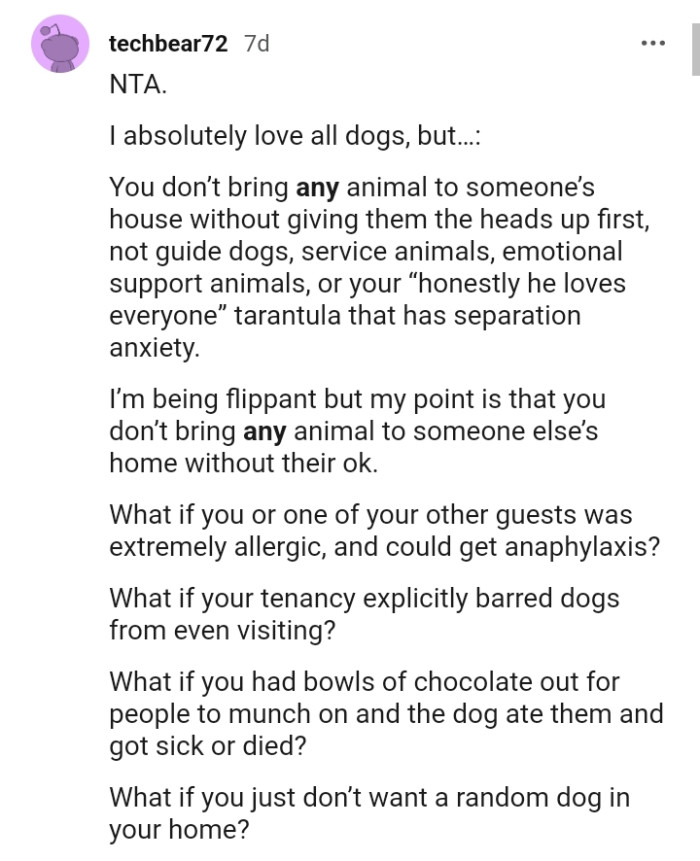
Furthermore, encouraging hosts to consider the needs of all guests, including those with service animals, can enhance the overall social experience. Establishing guidelines that prioritize inclusivity can lead to more harmonious gatherings and reduce conflict. Studies show that inclusive practices benefit not only individuals with disabilities but also enrich the experiences of the entire group.
Ultimately, fostering a culture of understanding and acceptance is key to creating welcoming environments for everyone.
A service dog is trained to perform a specific task that increases the amount of time a person with a disability can engage in daily life. Some Redditors say OP does not discriminate on the basis of disability, as he's only enforcing a home rule.
If it had been another dog owner, nothing would have changed; the impairment is unrelated to this circumstance. Still, the story was given an "everyone sucks" verdict.
Psychological Analysis
This situation reflects a common challenge where misunderstandings about service animals lead to conflict. It's essential for individuals to recognize the importance of respecting the rights of those with service animals. Open dialogue and education can foster a more inclusive environment for everyone involved.
Analysis generated by AI
Analysis & Alternative Approaches
In conclusion, the dynamics surrounding service animals in social settings highlight the need for greater understanding and acceptance. By promoting education and fostering open communication, communities can create more inclusive environments.
Ultimately, recognizing the value of service animals in supporting individuals can enhance social cohesion and respect.



